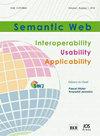MTab4D: Semantic annotation of tabular data with DBpedia
IF 2.9
3区 计算机科学
Q2 COMPUTER SCIENCE, ARTIFICIAL INTELLIGENCE
引用次数: 0
Abstract
Semantic annotation of tabular data is the process of matching table elements with knowledge graphs. As a result, the table contents could be interpreted or inferred using knowledge graph concepts, enabling them to be useful in downstream applications such as data analytics and management. Nevertheless, semantic annotation tasks are challenging due to insufficient tabular data descriptions, heterogeneous schema, and vocabulary issues. This paper presents an automatic semantic annotation system for tabular data, called MTab4D, to generate annotations with DBpedia in three annotation tasks: 1) matching table cells to entities, 2) matching columns to entity types, and 3) matching pairs of columns to properties. In particular, we propose an annotation pipeline that combines multiple matching signals from different table elements to address schema heterogeneity, data ambiguity, and noisiness. Additionally, this paper provides insightful analysis and extra resources on benchmarking semantic annotation with knowledge graphs. Experimental results on the original and adapted datasets of the Semantic Web Challenge on Tabular Data to Knowledge Graph Matching (SemTab 2019) show that our system achieves an impressive performance for the three annotation tasks. MTab4D’s repository is publicly available at https://github.com/phucty/mtab4dbpedia.MTab4D:用DBpedia对表格数据进行语义注释
表格数据的语义标注是将表格元素与知识图进行匹配的过程。因此,可以使用知识图概念解释或推断表内容,从而使它们在下游应用程序(如数据分析和管理)中非常有用。然而,由于表格数据描述不足、异构模式和词汇表问题,语义注释任务具有挑战性。本文提出了一个名为MTab4D的表格数据自动语义注释系统,该系统使用DBpedia生成注释,实现了三个注释任务:1)将表格单元格与实体匹配,2)将列与实体类型匹配,3)将列对与属性匹配。特别是,我们提出了一个注释管道,它结合了来自不同表元素的多个匹配信号,以解决模式异构、数据模糊和噪声问题。此外,本文还提供了关于使用知识图对语义注释进行基准测试的深刻分析和额外资源。在表格数据到知识图匹配语义Web挑战赛(SemTab 2019)的原始和改编数据集上的实验结果表明,我们的系统在三个标注任务上取得了令人印象深刻的性能。MTab4D的存储库可在https://github.com/phucty/mtab4dbpedia公开获取。
本文章由计算机程序翻译,如有差异,请以英文原文为准。
求助全文
约1分钟内获得全文
求助全文
来源期刊

Semantic Web
COMPUTER SCIENCE, ARTIFICIAL INTELLIGENCEC-COMPUTER SCIENCE, INFORMATION SYSTEMS
CiteScore
8.30
自引率
6.70%
发文量
68
期刊介绍:
The journal Semantic Web – Interoperability, Usability, Applicability brings together researchers from various fields which share the vision and need for more effective and meaningful ways to share information across agents and services on the future internet and elsewhere. As such, Semantic Web technologies shall support the seamless integration of data, on-the-fly composition and interoperation of Web services, as well as more intuitive search engines. The semantics – or meaning – of information, however, cannot be defined without a context, which makes personalization, trust, and provenance core topics for Semantic Web research. New retrieval paradigms, user interfaces, and visualization techniques have to unleash the power of the Semantic Web and at the same time hide its complexity from the user. Based on this vision, the journal welcomes contributions ranging from theoretical and foundational research over methods and tools to descriptions of concrete ontologies and applications in all areas. We especially welcome papers which add a social, spatial, and temporal dimension to Semantic Web research, as well as application-oriented papers making use of formal semantics.
 求助内容:
求助内容: 应助结果提醒方式:
应助结果提醒方式:


